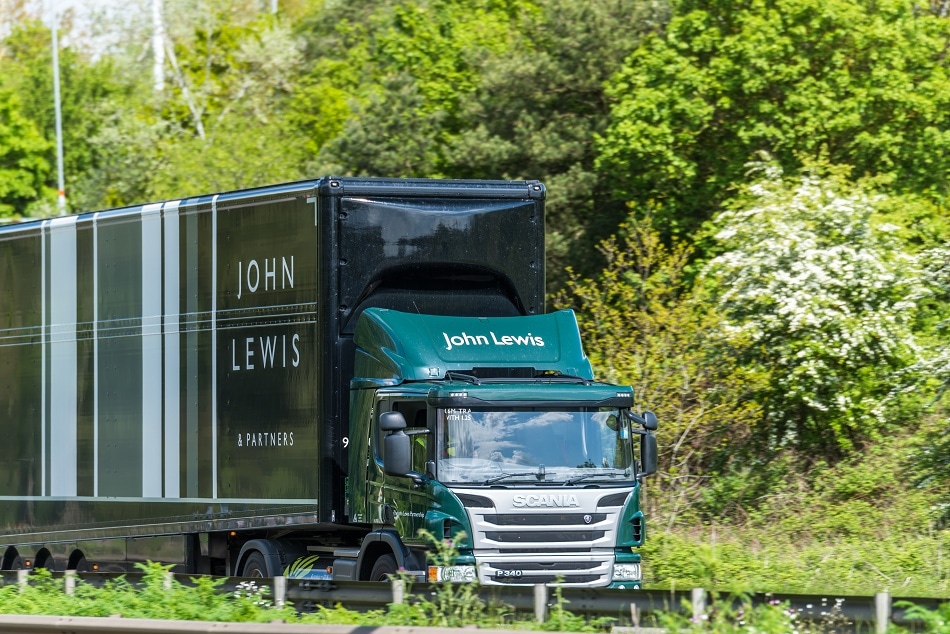
Image Credit: Jevanto Productions/Shutterstock.com
British retailer John Lewis is aiming to reduce its carbon emissions by fueling hundreds of its delivery trucks with cow manure. The move away from the pollutant heavy diesel fuel will be initiated in 2021 as the company takes a step toward reducing its carbon footprint and implementing a greener transportation and distribution service.
With 80 of the retailer’s vans currently running on biomethane made from food waste, John Lewis plans to expand this number to around 200 over the next 18 months. Once this phase of expansion has been completed the strategy will then be to switch to a biomethane made from processed manure slurry. Then, the aim is to further increase the size of the fleet to over 300 vehicles running on the newer manure-based gas in 2021.
We have been pioneering the adoption of long-distance biomethane trucks in the UK and scaling this up to our entire heavy truck fleet will deliver significant environmental and operational benefits. Five biomethane trucks produce the same emissions as one diesel lorry and they are also much quieter, helping reduce not only greenhouse gas emissions and air pollution but also noise pollution in our cities.
Justin Laney, Partner and General Manager for Central Transport, John Lewis Partnership
The company supplying John Lewis with the renewable biomethane, CNG Fuels, also aims to supply the 200-strong convoy of parcel delivery and courier service company Hermes. Other companies making the switch to CNG’s biomethane fuels include Royal Mail, DHL, Argos, and Asda.
CNG states that its biofuel is one of the most environmentally friendly and cost-effective solutions for HGVs, costing around 35-40% less than diesel fuel and emitting up to 85% fewer greenhouse gases. The company says that the compressed natural gas which is made from food-waste as well as animal waste could also be sourced by processing sewage produced from human waste.
Heavy Good Vehicles (HGVs) currently account for around 16% of the UK’s greenhouse gas (GHG) emissions despite making up just 5% of total vehicle miles, according to the government’s Department of Transport. Thus, the possibility of a large distribution network running on environmentally friendly biomethane means the UK’s HGV fleets would make progress towards hitting low-emissions targets in line with the international community. Current policy dictates that the UK must reduce its GHG emissions by at least 80%, relative to the levels last seen in 1990.
Renewable biomethane sourced from manure is currently the best low-carbon solution for HGVs, but we want to be ready to support our customers when other technologies are commercially viable for freight transport.
Philip Fjeld, Chief Executive, CNG Fuels
Therefore, to have John Lewis, one of the UK’s largest retailers, spearheading the switch to renewable biomethane fuel is an encouraging message for others to follow. Furthermore, the retail giant announced in 2018 plans to switch all of its HGV trucks to pioneering biomethane powered vehicles by 2028. A move that will surely be welcomed by the Department of Transport who are aiming to significantly reduce UK emissions having already introduced the HGV accreditation scheme.
The John Lewis Partnership project aims to crucially lower the companies carbon emissions with projections that the company will reduce its carbon footprint by saving over 49,000 tons of carbon emissions each year. Industry-led initiatives play an important role in reducing GHG emissions and with companies already making small steps to improve their carbon footprint the UK reported a 2.4% decrease of carbon emissions between 2017-18.
Disclaimer: The views expressed here are those of the author expressed in their private capacity and do not necessarily represent the views of AZoM.com Limited T/A AZoNetwork the owner and operator of this website. This disclaimer forms part of the Terms and conditions of use of this website.